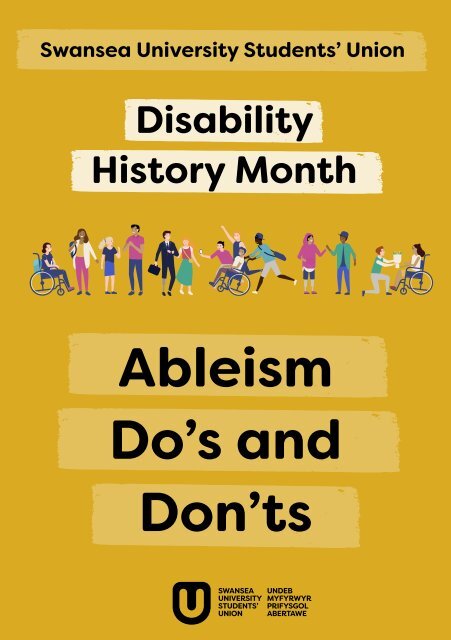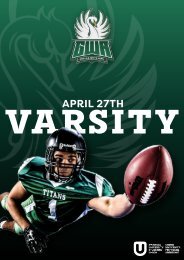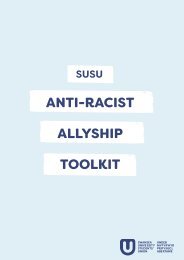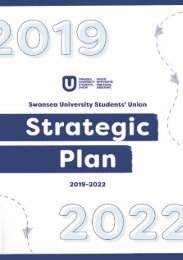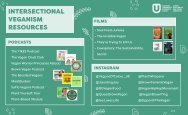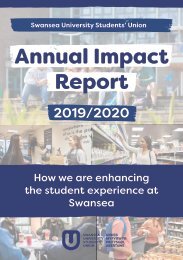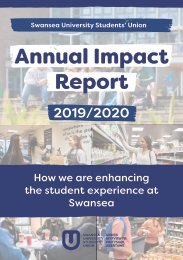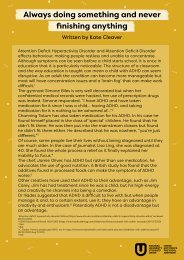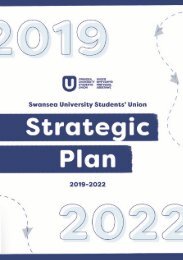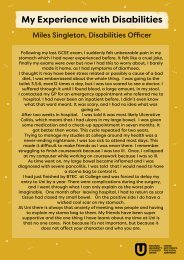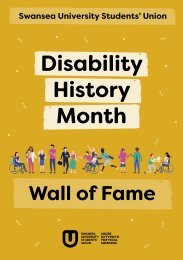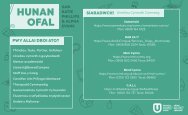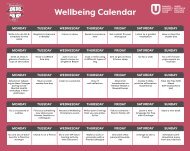Disability History Month: Ableism Do's and Don'ts
Create successful ePaper yourself
Turn your PDF publications into a flip-book with our unique Google optimized e-Paper software.
Swansea University Students’ Union<br />
<strong>Disability</strong><br />
<strong>History</strong> <strong>Month</strong><br />
<strong>Ableism</strong><br />
Do’s <strong>and</strong><br />
Don’ts
Do’s<br />
Do talk to disabled people - use the same tone <strong>and</strong><br />
language as you would with anyone else, don’t infantilise<br />
disabled people (talk to them like children) <strong>and</strong> avoid<br />
comments like, “I wish I had a wheelchair”, it’s quite<br />
patronising.<br />
Do actively listen - Really listen when disabled people talk<br />
to you, this includes listening if they want to talk about<br />
their disability, this will show them that you value them<br />
<strong>and</strong> will help ensure they don’t feel dismissed.<br />
Do feel free to offer help - You can offer to help them but<br />
watch your tone, avoid being pushy or condescending <strong>and</strong> if<br />
they decline the offer, listen <strong>and</strong> accept that they said “no”.<br />
Be considerate when making plans - Try <strong>and</strong> include your<br />
disabled friends <strong>and</strong> family members in activities <strong>and</strong> where<br />
possible, try <strong>and</strong> ensure it’s somewhere that is accessible or<br />
is an activity they can participate in, help ensure they aren’t<br />
isolated because of their disability.<br />
Treat disabled people as valued members of society -<br />
Disabled people can work <strong>and</strong> being active members in<br />
communities <strong>and</strong> society in general, disabled people want<br />
to have the opportunity to contribute like anyone else.
Don’ts<br />
Don’t use facilities designed for disabled people -<br />
Able-bodied people can use any facility but disabled<br />
people don’t have that option <strong>and</strong> rely on facilities such as<br />
accessible toilets <strong>and</strong> parking spaces.<br />
Don’t call disabled people inspirational - Saying that<br />
disabled people are inspirational just for doing normal<br />
things is condescending <strong>and</strong> implies that nothing is<br />
expected from them.<br />
Don’t play the blame game - Their lifestyle didn’t cause <strong>and</strong><br />
won’t be worsening their disability <strong>and</strong> they aren’t doing<br />
anything wrong.<br />
Don’t play disabled top-trumps - Don’t compare disabilities,<br />
different people have different experiences <strong>and</strong> ultimately,<br />
it’s not a competition.<br />
Don’t criticise disabled people for having a good day -<br />
Smiling, laughing, walking etc, doesn’t mean that their<br />
disabilities have gone away or “isn’t that bad”, let them<br />
enjoy their good days without making them feel guilty for<br />
having them.
Definitions<br />
<strong>Ableism</strong><br />
<strong>Ableism</strong> is discrimination in favour of non-disabled<br />
people. <strong>Ableism</strong> assumes that able-bodied people are<br />
superior to anyone living with a disability.<br />
The Stop <strong>Ableism</strong> Organisation describes ableism as:<br />
“The practices <strong>and</strong> dominant attitudes in society that<br />
devalue <strong>and</strong> limit the potential of persons with<br />
disabilities.”<br />
Disablism<br />
Disablism is discrimination or prejudice against<br />
disabled people.<br />
Microaggression<br />
• A microaggression is a subtle behaviour – verbal or<br />
non-verbal, conscious or unconscious – directed at a<br />
member of a marginalized group that has a derogatory,<br />
harmful effect.<br />
• Microaggressions are everyday actions <strong>and</strong> behaviours<br />
that have harmful effects on marginalized groups.<br />
• Unlike other forms of discrimination, the perpetrator of<br />
a microaggression may or may not be aware of the<br />
harmful effects of their behaviour.
Invisible Disabilities<br />
Definition<br />
Invisible <strong>Disability</strong>, or hidden disability, is an umbrella term that<br />
captures a whole spectrum of hidden disabilities or challenges<br />
that are primarily neurological in nature.<br />
Invisible Disabilities are certain kinds of disabilities that are not<br />
immediately apparent to others.<br />
Types of Invisible Disabilities<br />
ADHD<br />
Anosmia<br />
Anxiety disorders<br />
Allergies<br />
Arachnoiditis<br />
Asperger Syndrome<br />
Asthma<br />
Autism<br />
Bipolar disorder<br />
Brain injuries<br />
Chronic fatigue syndrome<br />
Chronic pain<br />
Circadian rhythm sleep disorders<br />
Coeliac Disease<br />
Crohn's disease<br />
Depression<br />
Diabetes<br />
Endometreosis
Epilepsy<br />
Fibromyalgia<br />
Fructose malabsorption<br />
Hereditary Fructose Intolerance<br />
Hyperhidrosis<br />
Hypoglycemia<br />
Inflammatory bowel disease (IBD)<br />
Interstitial cystitis<br />
Irritable Bowel Syndrome (IBS)<br />
Lactose Intolerance<br />
Lupus<br />
Lyme Disease<br />
Metabolic syndrome<br />
Migraines<br />
Multiple Sclerosis<br />
Multiple Chemical Sensitivity<br />
Myasthenia Gravis<br />
Narcolepsy<br />
Personality disorders<br />
Primary immunodeficiency<br />
Psychiatric disabilities<br />
Reflex Sympathetic Dystrophy<br />
Repetitive stress injuries<br />
Rheumatoid arthritis<br />
Schnitzler's Syndrome<br />
Schizophrenia<br />
Scleroderma<br />
Sjögren's Syndrome<br />
Trigeminal Neuralgia<br />
Spinal Disorders<br />
Temporom<strong>and</strong>ibular joint disorder<br />
Transverse Myelitis<br />
Ulcerative Colitis
Further Reading<br />
https://metro.co.uk/2020/02/11/what-does-being-ableist-m<br />
ean-12221655/<br />
https://www.scope.org.uk/about-us/disablism/<br />
https://themighty.com/2020/01/avoid-ableism-disability-all<br />
y/<br />
https://medium.com/swlh/everyday-ableism-what-is-it-<strong>and</strong>how-to-stop-doing-it-13ba1e737288#:~:text=To%20stop%2<br />
0everyday%20ableism%2C%20to%20change%20the%20st<br />
ory,<strong>and</strong>%20treat%20them%20as%20you%20would%20any<br />
one%20else.<br />
https://everydayfeminism.com/2013/10/avoid-everyday-able<br />
ism/<br />
https://dignity<strong>and</strong>respect.org/disabling-ableism/
Undeb Myfyrwyr Prifysgol Abertawe<br />
Mis Hanes<br />
Anabledd<br />
Gair i<br />
Gall am<br />
Ablaeth
Cofiwch<br />
Siarad â phobl anabl - defnyddiwch yr un naws ac iaith ag y<br />
byddech chi ag unrhyw un arall, peidiwch â siarad â phobl<br />
anabl fel plant a chofiwch osgoi sylwadau fel, "Rwy'n<br />
dymuno i mi gael cadair olwyn", mae'n eithaf nawddoglyd.<br />
Drin pobl anabl fel aelodau gwerthfawr o'r gymdeithas -<br />
Gall pobl anabl weithio a bod yn aelodau gweithgar mewn<br />
cymunedau a chymdeithas yn gyffredinol, mae pobl anabl<br />
eisiau cael cyfle i gyfrannu fel unrhyw un arall.<br />
Fod yn ystyriol wrth drefnu pethau - Ceisiwch gynnwys eich<br />
ffrindiau anabl ac aelodau anabl o'ch teulu mewn<br />
gweithgareddau a lle bo hynny'n bosibl, ceisiwch sicrhau ei<br />
fod yn rhywle sy'n hygyrch neu'n weithgaredd y gallant<br />
gymryd rhan ynddo, helpu i sicrhau nad ydyn nhw'n ynysig<br />
oherwydd eu hanabledd.<br />
Gynnig cymorth - Gallwch chi gynnig eu helpu ond gwyliwch<br />
eich tôn, cofiwch osgoi eu gwthio neu ymatal ac os ydyn<br />
nhw'n gwrthod y cynnig, gwr<strong>and</strong>ewch a derbyn eu bod wedi<br />
dweud "na".<br />
Wr<strong>and</strong>o'n weithredol - Gwr<strong>and</strong>ewch yn wirioneddol pan<br />
fydd pobl anabl yn siarad â chi, mae hyn yn cynnwys<br />
gwr<strong>and</strong>o os ydyn nhw eisiau siarad am eu hanabledd, bydd<br />
hyn yn dangos iddyn nhw eich bod chi'n eu gwerthfawrogi a<br />
bydd yn helpu i sicrhau nad ydyn nhw'n teimlo'n ddisail.
Peidiwch â<br />
Defnyddio cyfleusterau sydd ar gyfer pobl anabl- Gall pobl<br />
abl ddefnyddio unrhyw gyfleuster ond nid oes gan bobl<br />
anabl yr opsiwn hwnnw ac maent yn dibynnu ar<br />
gyfleusterau fel toiledau hygyrch a lleoedd parcio.<br />
Galw pobl anabl yn ysbrydoledig - Mae dweud bod pobl<br />
anabl yn ysbrydoledig am wneud pethau arferol yn<br />
nawddogol ac yn awgrymu nad oes disgwyl g<strong>and</strong>dynt.<br />
Eu beio - Nid oedd eu ffordd o fyw wedi achosi'r anabledd<br />
ac ni fyddant yn gwaethygu eu hanabledd ac nid ydynt yn<br />
gwneud unrhyw beth o'i le.<br />
Chymharu anableddau - mae gwahanol bobl yn cael<br />
gwahanol brofiadau ac yn y pen draw, nid yw'n<br />
gystadleuaeth.<br />
Peidiwch â beirniadu pobl anabl am gael diwrnod da - Nid<br />
yw gwenu, chwerthin, cerdded ac ati, yn golygu bod eu<br />
hanableddau wedi diflannu neu "ddim mor ddrwg â hynny",<br />
gadewch iddyn nhw fwynhau eu dyddiau da heb wneud<br />
iddyn nhw deimlo'n euog am eu cael nhw.
Diffiniadau<br />
Ablaeth<br />
Mae ablaeth yn gwahaniaethu o blaid pobl nad sy'n<br />
anabl. Mae ablaeth yn tybio bod pobl abl yn well nag<br />
unrhyw un sy'n byw gydag anabledd. Mae'r Sefydliad<br />
Stop <strong>Ableism</strong> yn disgrifio ablaeth fel:<br />
"Yr arferion a'r agweddau dominyddol mewn<br />
cymdeithas sy'n dibrisio ac yn cyfyngu potensial pobl<br />
ag anableddau."<br />
Anablaeth<br />
Anablaeth yw gwahaniaethu neu ragfarn yn erbyn<br />
pobl anabl.<br />
Micro-iselder<br />
• Mae micro-iselder yn ymddygiad cynnil – ar lafar neu fel<br />
arall, yn ymwybodol neu'n anymwybodol - wedi'i gyfeirio<br />
at aelod o grŵp ymylol sy'n cael effaith ddirmygus, niweidiol.<br />
• Mae micro-iselder yn weithred neu ymddygiad bob<br />
dydd sy'n cael effeithiau niweidiol ar grwpiau ymylol.<br />
• Yn wahanol i fathau eraill o wahaniaethu, efallai na fod<br />
cyflawnwr micro-iselder yn ymwybodol o effeithiau niweidiol<br />
eu hymddygiad.
Anablau Anweladwy<br />
Diffiniad<br />
Mae Anabledd Anweledig, neu anabledd cudd, yn derm sy'n<br />
dal sbectrwm cyfan o anableddau neu heriau cudd sydd yn<br />
bennaf yn niwrolegol eu natur.<br />
Mae Anableddau Anweledig yn fathau o anableddau nad ydyn<br />
nhw'n amlwg i eraill ar unwaith.<br />
Mathau o Anableddau Anweledig<br />
ADHD<br />
Anosmia<br />
Anhwylderau pryder<br />
Alergeddau<br />
Arachnoiditis<br />
Syndrom Asperger<br />
Asthma<br />
Awtistiaeth<br />
Anhwylder deubegwn<br />
Anafiadau i'r ymennydd<br />
Syndrom blinder cronig<br />
Poen cronig<br />
Anhwylderau cysgu rhythm circadia<br />
Clefyd Coeliag<br />
Clefyd Crohn<br />
Iselder<br />
Clefyd Siwgr<br />
Endometreosis
Epilepsi<br />
Ffibromyalgia<br />
Camamsugniad ffrwctos<br />
Anoddefedd Ffrwctos Etifeddol<br />
Hyperhidrosis<br />
Hypoglycemia<br />
Clefyd llidiol y coluddyn (IBD)<br />
Cystitis interstitaidd<br />
Syndrom Coluddyn Llidus (IBS)<br />
Anoddefedd lactos<br />
Lupus<br />
Clefyd Lyme<br />
Syndrom metabolaidd<br />
Meigryn<br />
Sglerosis Gwasgaredig<br />
Sensitifrwydd Cemegol Lluosog<br />
Myasthenia Gravis<br />
Narcolepsi<br />
Anhwylderau personoliaeth<br />
Imiwnoddiffygiant sylfaenol<br />
Anableddau seiciatryddol<br />
Nychdod Sympathetig Atblygol<br />
Anafiadau straen ailadroddus<br />
Arthritis gwynegol<br />
Syndrom Schnitzler<br />
Sgitsoffrenia<br />
Scleroderma<br />
Syndrom Sjögren<br />
Neuralgia trigeminaidd<br />
Anhwylderau'r Cefn<br />
Anhwylder cymal temporo'r m<strong>and</strong>ibl<br />
Myelitis Traws<br />
Llid Briwiol y Coluddyn
Darllen Pellach<br />
https://metro.co.uk/2020/02/11/what-does-being-ableist-m<br />
ean-12221655/<br />
https://www.scope.org.uk/about-us/disablism/<br />
https://themighty.com/2020/01/avoid-ableism-disability-all<br />
y/<br />
https://medium.com/swlh/everyday-ableism-what-is-it-<strong>and</strong>how-to-stop-doing-it-13ba1e737288#:~:text=To%20stop%2<br />
0everyday%20ableism%2C%20to%20change%20the%20st<br />
ory,<strong>and</strong>%20treat%20them%20as%20you%20would%20any<br />
one%20else.<br />
https://everydayfeminism.com/2013/10/avoid-everyday-able<br />
ism/<br />
https://dignity<strong>and</strong>respect.org/disabling-ableism/


